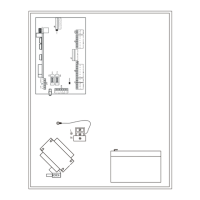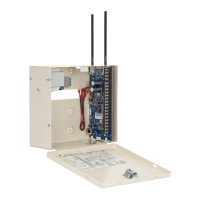208 Advisor Advanced ATSx000A(-IP) Installation and Programming Manual
After all necessary events are successfully reported to the central station, the
system closes the communication and tries to contact the next central station,
which the active events need to be reported to.
Event priority
In the queue of events waiting for the central station reporting, events with higher
priority are transmitted first. See Table 41 on page 223 for event priority values.
Failed to communicate (FTC)
Each central station has the “9.1.n.7 Retry count” described on page 165. When
the unsuccessful communication attempts reached this limit, the system stops to
try to report to this central station, and generates FTC fault for this station.
Note: For Voice protocol, there is a possibility to avoid FTC fault using option
“9.1.n.8.2.1 Suppress FTC” on page 167.
In FTC condition, the system still tries to re-establish the communication with the
central station using test calls that are configured in the “1.2.6 Test call opts”
menu described on page 54.
Note: If “1.2.6.n.4 Freq TC if FTC” on page 55 is set to Yes, the test call is
attempted every hour until FTC fault restores.
If there are new events for this central station, the system starts communication
attempts over again.
If due to retry limits the panel is unable to deliver an event to any of the central
stations it is mapped to, the Global FTC fault is generated.
For example, there is the primary central station CS 1, and its backup central
stations CS 2 and CS 3. The retry counter is set to four. Advisor Advanced tries
to report to central stations in the following order:
1, 1, 2, 2, 3, 3, 1, 2, 3, 1, <FTC 1 occurs>, 2, <FTC 2 occurs>, 3, <FTC 3
occurs>, <Global FTC occurs>.
When Global FTC occurs, unreported events are deleted from the reporting
queue.
An event, which occurs after Global FTC, resets all reporting counters.

